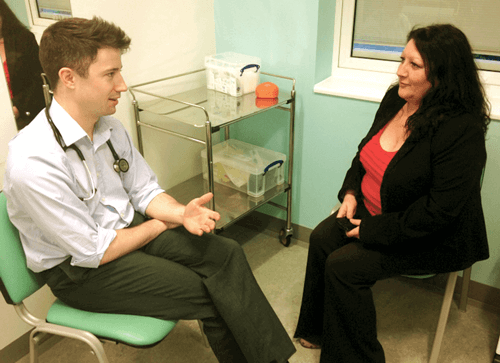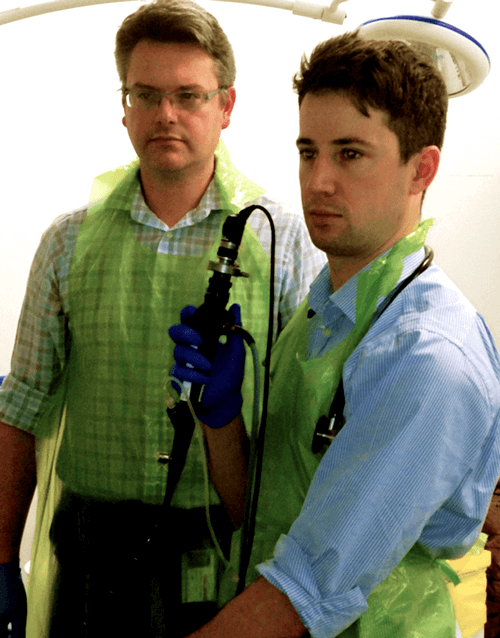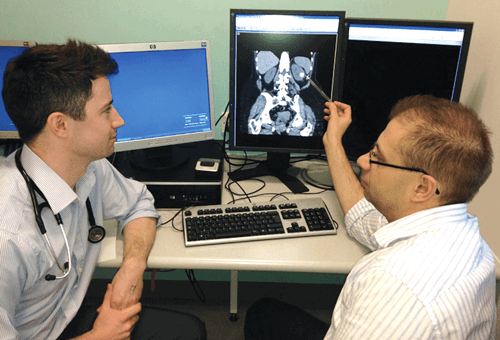National Selection pits the best of the UK’s core surgical trainees (sorry – that includes EEC countries as well) against each other in a process that determines who is allowed to proceed into higher surgical training. For the successful, it represents a ticket to a career in urology with an (almost) assured place on the specialist register. By the time that interviews appear on the horizon, the die is almost always already cast. The determined and pro-active trainee has already maximised training and educational opportunities (and made absolutely clear that this is reflected in their portfolio). For many, this process may have started in undergraduate years (with themed electives and medical school special modules, etc). In this issue’s trainees’ forum, Donal Bradley (a core trainee himself) outlines the opportunities open to those who find themselves in urology departments up and down the country and advises on the opportunities open to all those with the foresight to seize them. If your CT2 turns up at the next departmental MDT, then you’ll know they have read this article by Donal!
Tim Lane, Editor (2012-2015), Urology News.
Last August I commenced core surgical training on a urology-themed rotation in the North West. Like many, I was glad to finally be able to focus on surgery as my preferred specialty. All the same, I was immediately struck by an increase in the intensity of the workload and the dramatic increase in the level of responsibility that core training entails. Having recently commenced a hard earned training post in urology, the first year trainee (CT1) is abruptly faced with the next milestone – achieving the competencies required to become a registrar at ST3.
With barely a moment to pause after the foundation years, the trainee must embrace the opportunities that core training presents and work towards becoming a safe and competent practitioner. But a core trainee’s time is short and each must strive to take full advantage of his / her first two years in the specialty. Here I’ve tried to detail some of my experiences as a CT1 in urology and look at the myriad opportunities and resources available to core urological trainees in the UK.
A day in the life…
Urology involves considerably more medical management than many other surgical specialties. Consequently, a wide variety of core urology cases can be found on the ward. Here trainees can learn to manage both elective and emergency cases involving infections, oncology, stone disease, trauma and more. Some will no doubt be sorry to hear that despite graduating to the lofty heights of CT1, discharge summaries, cannulas and drug cards still fall within your remit!
Most will be working with foundation trainees who will undoubtedly require support and advice, but taking time to help these more junior colleagues is beneficial for the whole team. As a senior house officer your ability to take more of a leadership role in the day to day running of the ward will not go unnoticed, as this in turn allows the registrars to focus on their responsibilities and ensures the smooth running of the department.
Kind regards, yours sincerely…
The urology clinic presents one of the best learning opportunities for core trainees. Participation in clinic encourages trainees to become more active members of the urology team, contributing to the department’s workload rather than simply being a steward for the wards. The clinic is where one can learn most about core urological subjects and common presentations such as renal calculi, incontinence, haematuria, lower urinary tract symptoms and so forth. For many trainees this will be the first time they have consulted patients alone in a clinic setting, which is daunting at first. A few urology departments run a ‘one stop’ clinic, which is fantastic for trainees. Because scans, cystoscopies and transrectal ultrasound (TRUS) biopsies can be performed during clinic, trainees are able to experience first hand the entire journey from history and examination right through to investigation and diagnosis.
Assessing patients independently encourages trainees to become active learners, each day reviewing and expanding their knowledge. I found two books in particular to be invaluable to me over the past five months. The first is the Oxford Handbook of Urology [1] which acts as a quick guide to which I can refer whilst in clinic or on the ward. The second is Comprehensive Urology by Weiss, George and Reilly [2]. Though a slightly older textbook (2001), it is renowned for its in depth detail on all urological topics.
For more up to date knowledge it’s important to keep abreast of current guidelines. National Institute of Health and Care Excellence (NICE), British Association of Urological Surgeons (BAUS) and European Association of Urology (EAU) guidelines are readily available on the internet and are an essential reference when assessing patients. Whilst somewhat heavy going in terms of depth of information, there are quick reference guidelines to summarise key points. Ultimately a trainee becomes infinitely more useful to a department if he / she can confidently see patients in clinic and start to make sensible decisions for management.
A regular in theatre
Upon becoming a CT1, time in theatre is finally considered a fundamental right of your training rather than simply a privilege. It goes without saying that it’s in your best interests to get into theatre as much as possible, time and ward commitments permitting.
Urology is a terrific specialty in terms of early practical experience and there is a great emphasis amongst senior colleagues on teaching practical skills in theatre. This in part owes to the nature of urological surgery, which includes a wide range of more minor and lower risk procedures. The best lists to attend as a trainee are those that include these short cases such as circumcisions, hydrocoele repairs, TRUS biopsies, vasectomies, cystoscopies, ureteric stent insertions and orchidectomies. Of course trainees should endeavour to attend larger cases like prostatectomies and nephrectomies if possible. But during the early part of your training it is arguably more useful to establish the fundamental skills of tissue handling and suturing, rather than simply holding a laparoscope.
Perhaps the most important procedure to master in urology is cystoscopy. Cystoscopy marries the skills of spatial awareness, careful observation and dexterity, together in one procedure. Aside from forming the basis of many urological diagnoses, flexible and rigid cystoscopies are a chance to demonstrate your hand eye co-ordination. If you can prove your safety and skill during diagnostic cystoscopies, your senior colleagues will no doubt be happy to supervise you performing more complex endoscopic procedures such as ureteric stent insertion, tumour biopsies and even rigid ureteroscopies.
Whether in theatre, clinic or in an emergency setting, cystoscopy is a fundamental skill that trainees are expected to be able to perform independently very early on. A great way to practise is by attending cystoscopy clinics and lists during which many patients are assessed. In certain hospitals, trainees are even given their own cystoscopy lists to encourage independence in this skill. It is certainly reassuring for supervisors and interviewers to see several hundred cystoscopies within a trainee’s logbook at the end of core training.
“Your case was discussed at the MDT…”
An opportunity that is sometimes neglected by trainees is the multidisciplinary team (MDT) meeting. Certainly as a medical student the MDT was hard to follow, but by taking an active role in discussing patients the value of these meetings becomes clear. When consulting a textbook on bladder cancer for example, the choice for management can often seem very simple. But in reality each patient is very different, cancers can differ in grade and stage and the facilities for management can vary from trust to trust. The MDT meeting provides a unique opportunity to hear consultants discuss the intricacies of the management plans for complex oncological cases that one simply cannot learn from a textbook.
The experience of researching and presenting patients is daunting to say the least. The pace of the meeting is intense and consultants will frequently grill you on the minutiae of each case as you desperately attempt to scribble down the management plan. However, after attending over a few weeks the process becomes more familiar. I personally enjoyed the continuity of meeting a patient in clinic, listing them on the MDT, hearing their discussion, dictating their letter and finally seeing them again to discuss their management.
Courses, conferences and meetings
Trainees are constantly bombarded with reminders of the many requirements that they must fulfil before applying for an ST3 post, so I won’t labour the point. Needless to say, audit, posters, presentations, publications, teaching and research are all essential parts of a trainee’s experience in urology, as much as any surgical specialty. There are, however, many useful meetings and courses specific to urology that trainees may find useful for their learning and professional development.
The BAUS ‘Introduction to Urology’ course is organised by the BAUS Office of Education. This four-day course is hosted by a number of the UK’s eminent urologists, who deliver short discussions on a range of urological topics aimed at core and early specialty trainees, whilst also giving some handy tips on how to improve your chances when applying for a registrar post. The course comes highly recommended by previous attendees and is frequently quoted by senior trainees and consultants as an important course to attend for those who are dedicated to a career in urology.
BAUS is an important organisation to be familiar with, not just for their guidelines, but also for their courses and conferences that run throughout the year. Many are above the scope of core trainees but the BAUS annual meeting, to be held this year in Liverpool, is a great chance for trainees to submit abstracts for posters, presentations and video posters. As one would expect, presenting at this meeting would look extremely impressive when applying for an ST3 post in urology. Clearly the highlight of the UK urology year, urologists from across the country congregate to present and discuss burning issues facing the specialty. Several varied courses are run during the BAUS meeting. For example, cadaveric anatomy, ureteroscopic skills, management of scrotal emergencies, preparation for consultant posts etc. As well as discussing the urological side of things, BAUS is a great social gathering with many meals and drinks, a mini football tournament and a ‘big booze up’ arranged by trainees specifically for trainees of all levels.

Another organisation that trainees should be aware of is the Specialist Urology Registrars Group (SURG). This group provides a forum for members to discuss matters and express opinions on training issues arising on a regional and national level. Though ‘registrar’ is in the name, any surgical trainee dedicated to a career in urology is welcome to join. They have an annual meeting over a weekend in September, which is held at a variety of locations across the country. This is an important forum for presentations (but almost as importantly for social networking, etc). The SURG group run an active website with regular email updates regarding upcoming courses, revision aids for the FRCS (Urol), social events and job vacancies.
For the trainee who has an unlimited cache of funds, there are literally hundreds of useful courses available to augment one’s training. The Royal College of Surgeons offers the ‘Operative Skills in Urology’ course, consisting of four modules. Always quick to fill up, these courses take place over two days and are designed to introduce, develop and further trainees’ urological skills. The course is delivered through lectures, small group demonstrations and hands on experience with models and cadavers.
But courses don’t have to be expensive. Hospitals all around the country offer urology study days or emergency urology courses aimed at versing trainees in the most important aspects of urology. In March, Addenbrooke’s Hospital in Cambridge offers a one-day course aimed at foundation and core trainees covering all aspects of emergency urology, priced at just £65.
Conclusion
Like in any surgical specialty, urology trainees who are conscientious and dedicated will shine at interview. But before you can even consider applying, trainees have to arm themselves with the knowledge, the experience and the skill set that is expected of a urology registrar. By maximising the learning opportunities that are available every day, trainees should manage this with ease.
References
1. Reynard J, Brewster S, Biers S. Oxford Handbook of Urology, 3rd Edition. Oxford University Press; 2013.
2. Weiss RM, George NJR, O’Reilly PH. Comprehensive Urology. Mosby; 2001.
Useful websites
http://www.baus.org.uk/
http://www.rcseng.ac.uk/
http://surg-online.net/
TAKE HOME MESSAGE
-
The core trainee is often the most senior doctor on the ward, so your responsibilities on the ward still take precedence.
-
Clinic is a superb opportunity to see core urological problems and presentations, as well as contribute to the running of the department.
-
Cystoscopy is one of most fundamental procedural skills in urology – practise it at every opportunity as you will be expected to be able to perform it independently at an early stage.
-
Aim to attend theatre lists containing shorter cases in order to gain the most practical experience.
-
MDT meetings are a great chance to learn about how to manage complex oncological patients.
-
The BAUS ‘Introduction to Urology’ course is widely held as a key course for potential urological trainees to attend.







